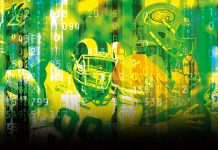 The enactment of Federal Law No. 13,756/18 in December 2018 was followed by progress on developing regulations over the course of 2019. Now the stage is set for a successful launch in 2020, writes Neil Montgomery of Montgomery & Associados.
The enactment of Federal Law No. 13,756/18 in December 2018 was followed by progress on developing regulations over the course of 2019. Now the stage is set for a successful launch in 2020, writes Neil Montgomery of Montgomery & Associados.
Despite industry expectations, 2019 ended without the Federal Government having published final regulations for sports betting. While Federal Law No. 13,756/18 set out a period of two years, which can be extended for an additional two-year period, to develop regulations, progress was such that the process looked set to be completed in just 12 months.
While this did not occur, 2019 has without a doubt been a very busy year for the Secretariat of Public Policy Evaluation, Planning, Energy and Lotteries (SECAP), the body responsible for drafting the Presidential Decree that will regulate Law No. 13,756/18. Indeed, during the second semester, besides finally being able to sell LOTEX in October (after several frustrated attempts) to a consortium formed by International Game Technology and Scientific Games International, SECAP launched two public consultations on sports betting.
The first produced more than 1,800 contributions from companies and punters from around the world submitting responses. The second resulted in more than 2,400 suggestions on the draft wording of the Decree.
What became clear from each public consultation was that taxation was one of the most important concerns raised by the industry. This is because Law No. 13,756/2018 provides for a specific taxation regime for both land-based and online operators.
Land-based operators are subject to: (i) taxes and fees equal to 6% of turnover; (ii) an obligation to distribute at least 80% of turnover as prizes and income tax over prizes; and (iii) a clause that limits operators to retaining 14% of turnover.
Meanwhile, online providers are subject to: (i) taxes and fees amounting to 3% of turnover; (ii) an obligation to distribute at least 89% of turnover as prizes and income tax over prizes; and (iii) a clause that limits operators to retaining 8% of turnover.
However, the draft Presidential Decree suggested both land-based and online operators would be subject to taxes and fees of 1% over turnover and 99% should be retained to cover the operator’s finances, maintenance costs and payout.
The draft Decree incorporated many of the industry’s requests, since the specific taxes and fees originally outlined in the Law No. 13,756/2018 were extremely high when compared with other jurisdictions. However, the industry has shown signs of frustration since the decree is unable to change provisions of a law. Since the Decree, as an administrative norm, serves to regulate and supplement a law, it is always prevented from contradicting or extrapolating the contents of a law.
The lower tax rate can only be implemented by an amendment to Law No. 13,756/2018, which could take longer than the actual regulations to be released. The proposed changes would have to be voted and approved by the National Congress. Since 2020 is going to be an electoral year in Brazil, if legislation is to be passed to lower the tax rate, then the law would have to be approved by June. From the second semester, Congresspeople will be absent from Brasilia due to campaigning.
Another issue detected has been with the inspection and authorisation/licence fees payable by licensed operators to the Brazilian Federal Government, which are still under discussion.
In this regard, Law No. 13,756/2018 contemplates the creation of inspection fees, which will vary according to the amount of monthly payout effected by each operator, namely:
| Range of monthly payout | Monthly inspection fee | ||
| Up to BRL30,837,749.76 | BRL54,419.56 | ||
| From BRL30,837,749.77 to BRL51,396,249.60 | BRL90,699.26 | ||
| From BRL51,396,249.61 to BRL85,660,416.00 | BRL151,165.44 | ||
| From BRL85,660,416.01 to BRL142,767,360.00 | BRL251,942.40 | ||
| From BRL142,767,360.01 to BRL237,945,600.00 | BRL419,904.00 | ||
| From BRL237,945,600.01 to BRL396,576,000.00 | BRL699,840.00 | ||
| From BRL396,576,000.01 to BRL660,960,000.00 | BRL1,166,400.00 | ||
| Over BRL660,960,000.01 | BRL1,944,000.00 |
After Law No. 13,756/2018 was published, the industry complained that the fees were substantially higher than those charged in other jurisdictions. Since then the Ministry of Economy has informally stated that the inspection fees would be reduced to monthly payments of: (i) BRL20,000.00, for land-based operators; (ii) BRL30,000.00, for online operators; and (iii) BRL45,000.00, for the operators across both channels. Since such amounts were not enacted by Law, their validity can also be challenged.
There is also uncertainty as to the amount of the authorisation/license fee, since it was not mentioned in Law No. 13,756/2018. However, the draft Presidential Decree mentions that an authorization/licence fee will be payable by the operator, even though it does not set an exact amount. The Ministry of Economy has mentioned that the authorization fee should cost BRL3 million for a nine-year licence. This could ultimately be reduced for online operators, with a higher rate retained for land-based sports betting, and a combined amount for those active in both channels.
The Federal Government has said that it has the intention of issuing as many licences as possible. By doing so it aims to regularise, via the Brazilian subsidiaries that will have to be incorporated to obtain the licence, foreign operators currently accessing the Brazilian market and not adopting a quarantine approach, like other Latin American countries. However it appears there is a drive to increase certain financial amounts, such as the licence fee, to admit only the larger players.
This becomes even more evident when it comes to the financial reserve required to guarantee payout. Initially, such amount was set at BRL6 million. However, at the Online Gaming Summit in São Paulo earlier in December, the Brazilian regulator commented that such amount would increase to BRL18 million. Rumors suggest it could be increased even more.
It appears that the final version of the Presidential Decree will be issued in January 2020, prior to ICE London at which SECAP officials will speak. Once the norm has been published, it will take at least 6 months for the market to open.
While SECAP envisages that 90% of the wording of the draft Presidential Decree will be preserved in the final version thereof, there is still a considerable level of uncertainty regarding the final conditions. In any event, the regulation of fixed odds sports betting will awaken a sleeping giant, which can have a domino effect in Latin America, a region which moves forward slowly but decisively.
Neil Montgomery is the Founding and Managing Partner of Montgomery & Associados (www.montgomery.adv.br), at which he heads the law firm’s Minds Sports, Draws, Gaming, Betting and Lottery Practice Group. Neil represents Brazil as a General Member at IMGL, is a published author and a regular speaker at international gaming and betting events.












